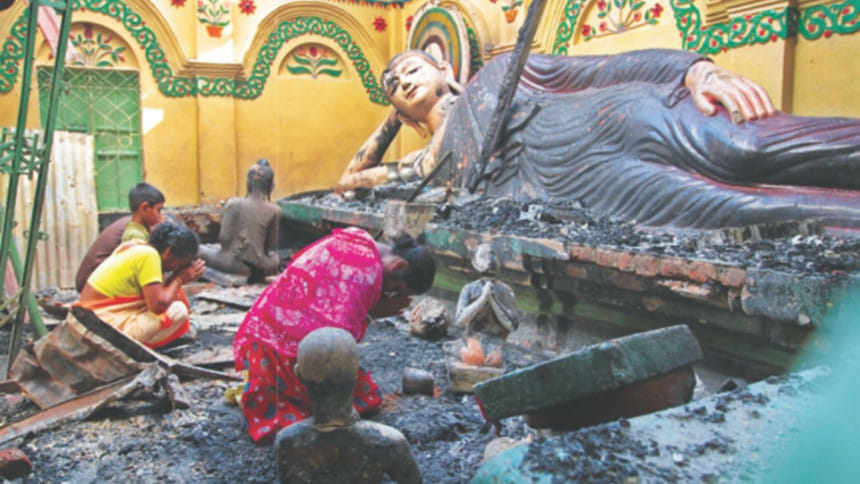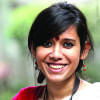LIVING WITH INJUSTICE

Three years ago, standing amidst the ruins of Sada Chit Bihar in Ramu –amidst beheaded statues, disintegrated remains of ancient texts and charred walls of prayer halls – I had attempted to console a grieving monk. What did one say to a person whose traditions, religious sites, ancient relics and, indeed, way of life had been attacked, violated, desecrated in a coordinated attack by the majority Bangali-Muslim population, by people who, prior to then, he had considered his neighbours, friends, brothers? I didn't know; and so, feebly, almost formulaically, I had muttered (as we civil society types do every time there is an incident of outrage): Justice will be served to those who carried out this monstrosity, you'll see. He didn't look up from the scraps of a Taal Pata Puthi (religious scroll on borassus flabellifer leaves) he held in his hands. "Justice?" he said resignedly, "There's no justice in this country; not for us anyway."
Three years later, his words have taken on a prophetic dimension. At this point, with the communal attacks in Ramu all but a distant memory in the minds of a nation prone to amnesia, justice seems like a far-off cry, a fantasy, a farce. Three years, numerous probes and 19 cases later, we still don't know who instigated the attack and why. Of 15,182 people named in different cases, only 483 were arrested, all of whom are currently out on bail.
Thousands of people, both locals and outsiders, had participated in the well-orchestrated attack on the Buddhist community in Ramu, following outcries over a derogatory image of Islam in Uttam Barua's Facebook account (subsequent investigations found that the photograph was forged). On September 29, 12 temples were burnt, six more were wrecked and at least 50 houses were destroyed; the next day, the violence spread to Ukhiya, Teknaf and Patiya, destroying a total of eight temples and monasteries, including two Hindu temples, and numerous Buddhist homes. Locals reported that members of all political parties, including prominent local leaders, took part in the violence in an ominous show of camaraderie. Characteristically enough though, after the event, the two parties went back to blaming each other for instigating the attack. Thus far, some leaders of the BNP-Jamaat have been named in the charge-sheet, but the names of AL leaders have been mysteriously left out by the police, even though the Buddhist community submitted a list to the SP naming the AL leaders who had played an undeniable role in the violence.
With a communal force like Jamaat in our backyard, it is easy enough to blame any and all acts of communal violence on them, allowing us, the liberals and seculars, to distance ourselves from the ugly side of majoritarian politics. But what happens when the story isn't as convenient as that? What happens when ruling party men themselves are involved, when it is under their patronage that attacks are carried out on Hindu families so that their land can be grabbed, or adivasi communities displaced from their homes (TDS, Dec 12, 2015; TDS July 15, 2015)? The answer's obvious enough. It's an age-old saying, after all, jor jar, mulluk tar (might is always right). It would be nothing if not naïve to expect the case of Ramu to be different, for the party to take a zero-tolerance stance on members who violated the principles the party professes to hold dear, for it to finally acknowledge the ways in which some of its members, inebriated on power, preyed on vulnerable populations, fuelling rather than challenging communal sentiments. It's much easier to absolve oneself from any and all blame when one is in power, even if there is evidence to the contrary.
And what of the local administration and law enforcement agencies, who stood by and watched the tragedy unfold, folded arms and all? The rampage continued for hours on end, unhindered. From the beginning of the first rally at 8.30/9 pm in the evening to the last attack, late at night (the last flames died at around 4.30 am), there was ample time and opportunity for the law enforcers to intervene, but they did nothing, ignoring the urgent appeals of the Buddhist community. What's even more inexplicable is how the violence could spread to Ukhiya, Patiya and Teknaf the following day.
We were "assured" after the attack that the in/action of the law enforcers would be "looked into" and "action taken against anyone found negligent of his duties". However, till now, no administrative or legal action has been taken against any person, except for closing the then SP of Cox's Bazar and the OC of Ramu Police Station and transferring them. The latter that night was seen on the stage of a rally, making a provocative comment to the effect, "I am a Muslim. I should have also joined the procession." As his questionable role really could not be denied, he subsequently became the"fall guy" in the Home Ministry and police probe reports. The police probe body blamed the then SP and OC for "failing to take appropriate measures" to contain the situation but did not suggest any action against the SP, nor did it mention anything about the failure of intelligence agencies in providing police authorities with information. The same report stated that the DC was having his farewell party at the time and "failed to judge the gravity of the situation", but, again, no action was suggested against him. The probes couldn't even provide a consistent timeline of when the police arrived and what they did at each step of the attack.
Two writ petitions were filed by Supreme Court lawyers seeking action against the perpetrators responsible for the attacks and the local administration officials on charge of neglect of duty. Following this, three probes were undertaken, but these have been pending with the HC for the last two years due to "technicalities". Interestingly, there are significant contradictions between those named in the judicial inquiry report and the charge-sheet issued by the police, which begs the question: once a criminal case is closed, what happens if and when the judiciary finds a different set of perpetrators? According to one of the writ petitioners, the judicial probe actually identifies an AL leader as the Number 1 perpetrator of the attack and names a number of other AL members as having been involved in the attack. These names are missing from the charge-sheets.
Under the circumstances, it is no wonder that eyewitnesses are shying away from giving testimonies. Locals don't know who they can trust, and who will protect them if they do name influential people in the community. In fact, those who gave testimonies for the judicial inquiry report were subsequently threatened, after the highly confidential document, along with the witnesses' names and details, was leaked. Why, after all, risk their lives and whatever little is left of their sense of security in the grand pursuit of justice, when there is no guarantee that those they name will ever even be arrested?
Impunity for communal attacks is nothing new; it's the norm, not the exception. Fourteen years since the post-election communal violence perpetrated against the Hindu community in 2001, no coordinated action has yet been taken to bring the masterminds to justice. The BNP-Jamaat alliance, which was in power at the time, and under whose aegis these attacks were allegedly carried out, categorically downplayed the magnitude of the violence, granting immunity to the perpetrators during their rule. In 2009, under the current regime, a judicial commission formed to probe the atrocities, found the involvement of 26,352 people, including 25 ministers and lawmakers of the previous BNP-Jamaat alliance government. But since then, beyond press conferences by the then Home Minister to share the report findings, what steps, we ask, has the government taken?
Minority communities in the country have learnt, if not to accept, at least to expect, impunity of criminals for crimes committed against them. With Ramu, we could have proved them wrong; we could have done things differently, we could have shown that "secularism" is not just a catch-phrase to be used in talk-shows and rallies. But history, as the Buddhist monk already knew three years ago, has a way of repeating itself, first as tragedy, second as farce, and then as Bangladeshi politics.
The writer is an activist and journalist.

 For all latest news, follow The Daily Star's Google News channel.
For all latest news, follow The Daily Star's Google News channel. 



Comments